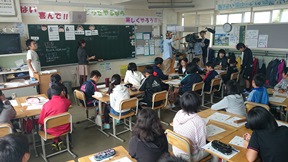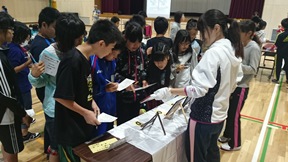2014年ニュース 一覧
- December.12.2014 世界知的所有権機関(WIPO)の知的財産権エンフォースメント研修で講義を行いました
- November.28.2014 東京都小平市立小平第十一小学校で「著作権授業」を開催しました
- November.24.2014 甲南大学 経済学部にて「映画配信ビジネスと著作権」に関して講義を行いました
- November.11.2014 海賊版DVD販売業者を現行犯逮捕 (大阪府警察本部生活安全特別捜査隊他)
- October.29.2014 第27回東京国際映画祭 共催企画 MPAセミナー「映画と資金 – 終わらないドラマ」を開催しました
- October.27.2014 第2回MPA/DHUフィルムワークショップ 開催 ~映画脚本シノプシス(あらすじ)コンテスト~ ピッチ審査により最優秀作品賞を選出
- September.12.2014 北海道釧路町立富原小学校にて「著作権授業」を開催致しました
- September.09.2014 JIMCA「埼玉サイバーセキュリティ推進会議」の設立に参加(埼玉県警察本部)
- August.29.2014 TOHOシネマズ 中部・関西地区にて盗撮防止セミナーを開催しました
- August.17.2014 コミックマーケット86企業ブースにて「STOP!違法ダウンロード リターンズ」キャンペーンを開催しました
- July.07.2014 コミックマーケット86出展決定!
- July.04.2014 TOHOシネマズ(株)本社にて映画盗撮防止セミナーを開催
- July.03.2014 DVDレンタル/販売店経営者らを逮捕 (警視庁 組織犯罪対策第一課、本所警察署)
- July.02.2014 「FC2動画」への違法アップロード者を逮捕 (群馬県警察本部 サイバー犯罪捜査室/高崎警察署)
- June.27.2014 宮崎県野尻中学校にて「著作権授業」を開催致しました
- June.27.2014 文化芸術振興議員連盟「映像問題研究会」にて講演しました
- June.17.2014 海賊版DVD販売業者を現行犯逮捕(大阪府西成警察署他)
- May.29.2014 内閣官房知的財産戦略推進事務局が実施した「『知的財産推進計画2014』の策定に向けた意見募集」に対し、意見書を提出
- May.27.2014 東京都墨田区立錦糸小学校で「著作権授業」を開催しました
- May.20.2014 2014年MPAAグローバル・リサーチ 知的財産プログラム(研究助成)のお知らせ
- May.14.2014 ファイル共有ソフトのユーザーは引き続き減少 ~「ファイル共有ソフトの利用実態調査(クローリング調査)」結果~
- May.13.2014 映画のシーンを無断複製したブライダルビデオが氾濫/JIMCAが正常化に向けて働きかけを継続
- April.25.2014 「サイバー空間の脅威に対する兵庫県官民合同プロジェクト」総会に参加
- April.24.2014 MPA/JIMCA、米国大使館の後援を得て「世界知的所有権の日」記念イベントを開催しました
- April.09.2014 「世界知的所有権の日」記念上映会を開催します
- April.01.2014 BitTorrent ユーザーおよび Gnutella ユーザー に対して、啓発メールを送付開始
- March.13.2014 文化庁の調査報告書で当協会活動が詳しく紹介されました
- March.06.2014 全国初、海賊版ブルーレイディスクを店舗で販売、逮捕 (大阪府都島警察署)
- March.05.2014 海賊版DVDを頒布目的で所持していた疑いで現行犯逮捕 (大阪府西成警察署他)
- March.03.2014 ファイル共有ソフト等を使用した著作権法違反事件 一斉集中取締まりの実施について
- February.28.2014 2月23日(日)、『サイバー犯罪撲滅キャンペーン』を開催します!
- February.24.2014 2月23日(日)、さいたま市にて 『サイバー犯罪撲滅キャンペーン』 を開催しました。
- February.17.2014 愛知県名古屋市の男性、映画を違法にアップロードしたとして逮捕 (愛知県警察本部サイバー犯罪対策課・中村警察署)
- February.07.2014 愛知県西尾市、半田市、豊田市などの店舗で海賊版DVD-Rを販売、3人を逮捕 (愛知県警察本部生活経済課・豊田警察署)
- February.06.2014 愛知県大口町立大口西小学校で「著作権授業」を開催しました
もっと見る
北海道釧路町立富原小学校にて「著作権授業」を開催致しました September.12.2014


On September 12, 2014, Japan and International Motion Picture Copyright Association (JIMCA) conducted a Copyright Class for sixth-graders at Tomihara Elementary School in Kushiro-Cho, Hokkaido. A JIMCA representative served as a lecturer, and a student from the Graduate School of Education, Waseda University assisted the lessons as a facilitator.
The Copyright Class consisted of two lessons – a quiz session and group discussion – for which two school periods were assigned. During the first lesson, a quiz rally – “Is this real or fake?” – children tackled six quizzes to determine the authenticity of goods such as DVDs of popular movies and toys portraying favored characters from animated shows. Since familiar goods were used for the quiz session, children genuinely enjoyed tackling the challenges, and some of the children even came up with perfect answers to all the questions.
In the second lesson, each class engaged in group discussions regarding the type of copyright issues that elementary students might encounter. A case study proposed was – “I secretly entered my friend’s drawing for a contest. The work was selected for the Best Work Award, for which a prize was awarded to the friend.” The students were asked whether this would be a problem according to the Copyright Law, and the question “What situations would qualify as copyright infringement?” was actively debated.
Many opinions such as “Since the person, who secretly sent the drawing, doesn’t gain any benefit, there shouldn’t be any problem, should there?” were given by the students. Lastly, the lecturer from JIMCA, provided a basic explanation on copyright matters. During a Q&A session at the end of the lesson, a great number of questions were asked by the students, including: “What is going to happen to the copyright, if the creator dies?”, “What kinds of actions are considered a violation of copyright?” etc.
Deputy Head Teacher Masayuki Takahata said, “Both children and adults are now much more aware about the value of copyrighted works that we usually come in contact with. It appears that many children thought benefiting monetarily was the only way one could violate another person’s copyright. I believe the students were able to understand that copyright infringements do occur regardless of whether or not a benefit is gained.”
Although copyright education is included in the government curriculum guidelines, some schools still have difficulty incorporating it. In order to introduce the idea of respecting intellectual property rights as well as copyright to young generations, JIMCA has visited a number of elementary schools in different parts of Japan and conducted the “Copyright Classes”, annually for five to six schools since 2011.

